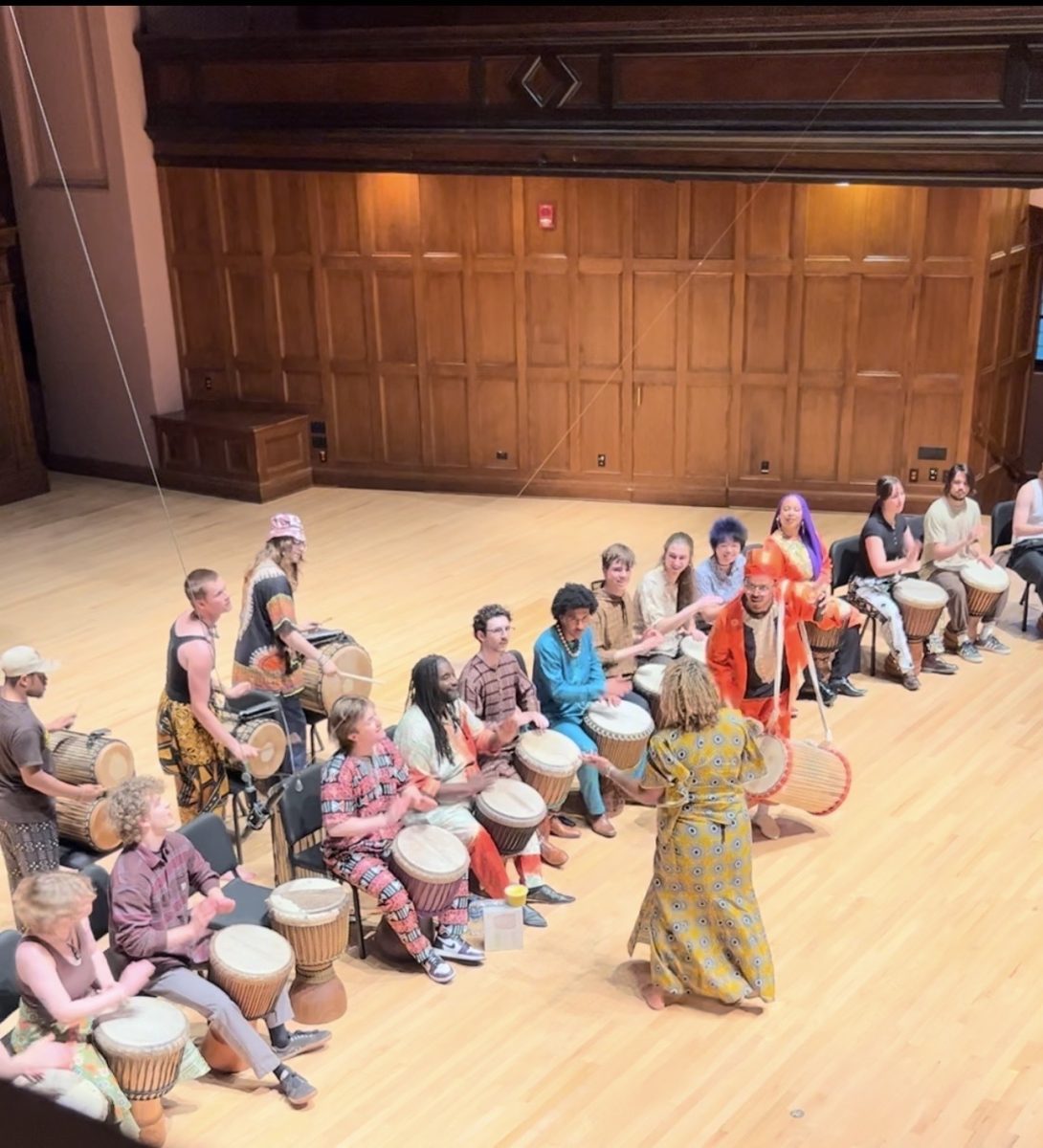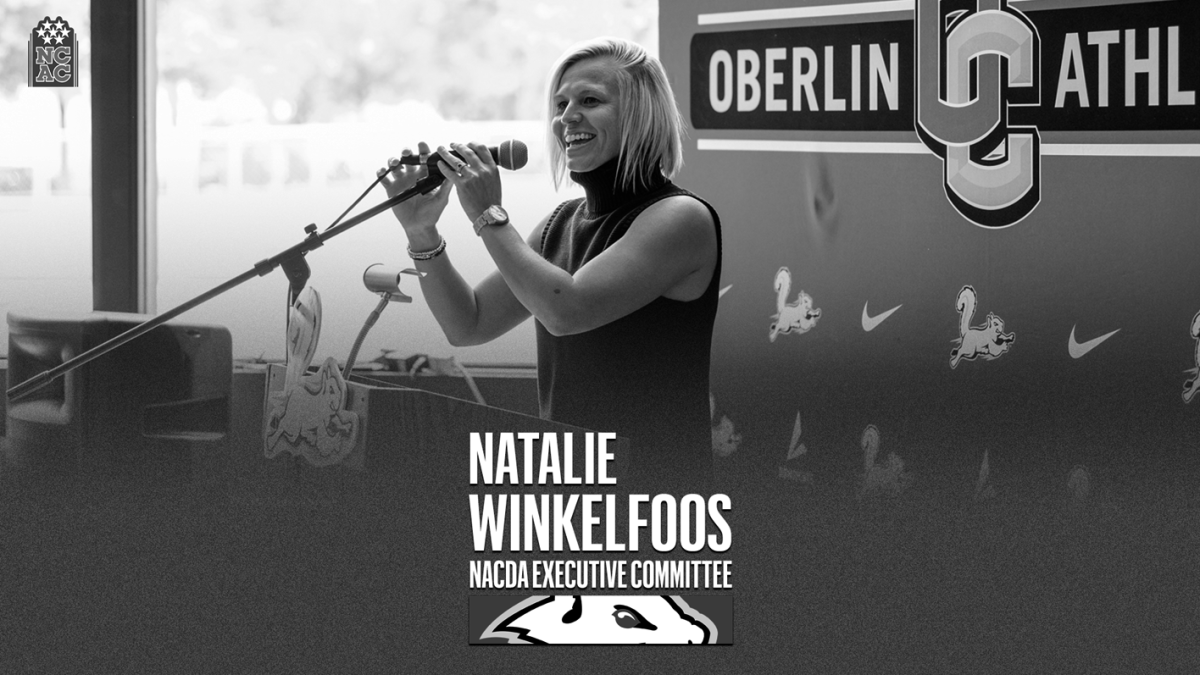CORRECTION: In the article “Djembe Orchestra Highlights Connection with West African Dance” (The Oberlin Review, Sept. 20, 2024), the Review claimed that there are no West African Dance classes being offered at the College. Although West African Dance Forms I, West African Dance Forms II, and West African Dance III are not currently being offered, there are African dance classes being taught this semester that incorporate West African Folkloric Dance into the curriculum. The department is acknowledging the African diasporic dance tradition through DANC 170 and DANC 144. The Review regrets this error.
“What happens to the baby when you separate it from his parents?” asks Weedie Braimah, associate professor of West African Drumming. He is referring to the intersectionality between drumming and dancing in the West African folkloric tradition. His class, Djembe Orchestra, which looks at West African folkloric traditional drumming, proved popular on campus this semester with 29 students enrolled and more auditing.
“We don’t have the full understanding and resurgence of African dance,” Braimah said. “That’s the history of how the class was started. It was started from the idea of maintaining a trajectory … with the dance.”
Oberlin students have been privileged to learn about and experience Braimah’s Djembe Orchestra class in the Conservatory, as well as the West African Dance class taught by his wife, Talise Campbell, in the Dance and Africana Studies departments for the past eight years. This year, Djembe Orchestra registration is at record levels, but there are no course offerings for West African Dance. In fact, Campbell’s name is nowhere in the registrar. Why?
“I think it’s still a little bit unknown,” Campbell said.
The story starts last December, when Oberlin announced that they would be looking for other candidates for the associate visiting professor of African Dance position which Campbell previously held.
“I quit a six figure paying job and took a $25,000 pay cut to come to Oberlin, because I thought that this genre of folklore was valued,” Campbell said. “It had been there for almost 30 years. So I was like, ‘Okay, it does have longevity. I can build something here.’ And that’s what happened. Something wonderful and magnificent was built over seven years, inclusive of the integration and the building of Djembe Orchestra that came out of all of this. … But sometimes when you build and things are really, really powerful, other people don’t like it. They don’t like the power that comes along with Africanity.”
In December 2023, things shifted.
“I was told [the Dance department was] going to do a ‘nationwide search to establish value,’” Campbell said. “Right then and there, … I knew that something wasn’t right.’”
Initially, Campbell resolved not to reapply. However, supportive professors on campus encouraged her to. Braimah threw his hat into the pot as well.
“If they don’t have West African Dance, I’m out. I’m only here because of students,” he said.
Braimah could not imagine coming back to Oberlin without the co-parent of this interdependent program. When students caught wind of the situation, they decided to fight. Emails were sent out to multiple communities on campus bringing awareness of the situation to students. Former students of Campbell and Brainmah shared their experiences and urged their classmates to stand with the professors in fighting for Campbell’s positions. Chudi Martin Jr., OC ’23, was at the forefront of these efforts.
“Students were very vocal in wanting Professor Talise to stay within the Dance department,” he said. “Students showed up at class demonstrations, sent numerous emails to academic deans and the Dance department, filled out paperwork in support of Professor Talise at her teaching and research demonstrations, and gave speeches at the end-of-year dance classes showcases. She had given us so much.”
This was because of the incredible impact these classes have had on the student population.
“Djembe Orchestra and West African Dance [were] my pipeline to explore the world by traveling to West Africa and learning traditions of my ancestors,” Martin said. “Numerous individuals who I have talked to across the United States and within West Africa have stated that if you do not have the opportunity to visit countries such as Gambia, Mali, Senegal, et cetera to learn the dance and music traditions, then the next best thing is to seek Mama Talise and Baba Weedie.”
Campbell expanded on what she and her husband bring to the school.
“The students loved it, highly benefited from it,” she said. “It was more than a dance class. It was more than that. It was a place where all students can come and have refuge from academia, specifically for African and Black and Brown students. It was a place that they could call home.”
But the decision still stood. This semester, there were no courses offered in folkloric West African dance, a symbol of the disacknowledgement of diversity within the African Diaspora. So a small team of supporters brainstormed what to do next.
“The whole summer,” Braimah recounts, “[Dean of the Conservatory William] Quillen, [Professor of Advanced Improvisation and Percussion] Jamey Haddad, [Associate Professor of Jazz Studies, Teacher of Jazz Composition and Trombone, and Division of Jazz Studies Director] Jay Ashby, and [Professor of Theater and Africana Studies] Caroline [Jackson-Smith] — we’re all like, ‘Okay, so what are we going to do?’”
Four days before the start of classes, a compromise was reached. Braimah, in Spain, received a call offering Campbell and him an opportunity to teach side by side at the Conservatory. However, Campbell would not be listed as a professor of any classes, and her class was renamed from “West African Dance” to “Djembe Practicum,” listed under Braimah’s name. This is not to mention the course’s loss in number of credit units and Dance accreditation. It was also brought to the attention of most students after semester schedules had been confirmed. While Djembe Orchestra grows, Campbell’s once thriving classes have been passed into obscurity while the word slowly spreads about the circumstances.
Despite the challenges, students and faculty alike are happy to welcome the couple back.
“Djembe Orchestra is an extraordinary ensemble and we are so, so very thrilled that our students can continue participating in it,” Quillen said.
Braimah is also glad to return.
“One thing I will say is that I’m very happy to be back,” he said. “There are a lot of things behind the scenes that’s still going on that’s very sad, absolutely, absolutely. But the word I have is … ‘forgiveness.’”
The folkloric West African program will continue to be appreciated in the Conservatory.
“I feel Oberlin is home,” Braimah said.







